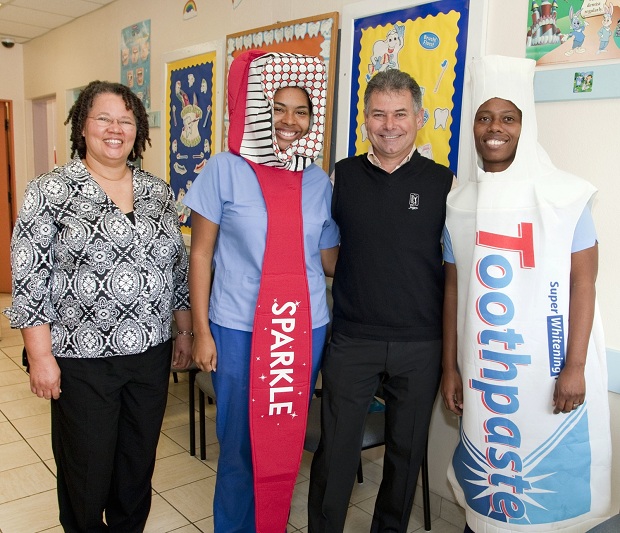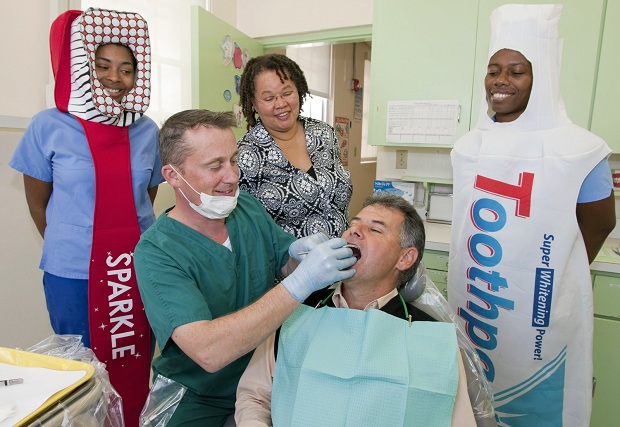Minister Promotes Dental Health Awareness
Earlier this week the Minister of Health Zane DeSilva ‘brushed up’ on his dental health practices during a visit to the Hamilton Health Center’s Dental Section, in a bid to promote February as Dental Health Awareness Month.
“I am encouraged by the recent findings of the “Health In Review” report, released last month, which state that Bermuda’s youth have an impressively low rate of tooth decay and cavities per individual,” said Minister DeSilva. “However, it is still important to stress the need for regular dental check-ups and proper dental health practices. In addition, I want to take this opportunity to praise the Department of Health for their efforts in promoting February as Dental Health Awareness Month.”
Senior Dental Officer for the Department of Health Dr. Celia Nzabalinda said that although poor oral health is not due to one thing by itself, hygiene and diet are certainly the two most important factors.
“Snacking is a significant problem,” Dr. Nzabalinda said. “Normally, the mouth is slightly alkaline and when we eat it becomes acidic for a short period of time due to increased bacterial activity. It soon returns to its alkaline state. But when we snack throughout the day we repeatedly feed the bacteria and they become more active – producing acid throughout the day. Consequently, the mouth becomes more acidic and the teeth are broken down by the acid causing cavities.”
Pictured below are Senior Dental Officer Dr. Celia Nzabalinda, Dental Assistant Zuwena Codrington/Toothbrush, Minister DeSilva, and Dental Assistant Erica Thomas/Toothpaste,
To keep the cavities at bay, Dr. Nzabalinda says most dental practices carry out a dental cleaning every six months and that often a dental examination is done at one of these visits on a yearly basis.
She said: “Some individuals may need to be checked more often if they have a condition that makes them prone to dental problems such as gum disease.
Children are recommended to begin checkups by their first birthday and to continue every six months.” To encourage a reluctant child to brush their teeth, Dr. Nzabalinda recommends parents use toothpaste specifically made for children as some adult toothpastes can taste too strong for some children.
However, she warns that the toothpaste should be kept out of reach of young children as some of them will “eat it like candy”. “Only a pea size amount should be used for an older child and very young children only require a slight smear on the brush,” she said. “Some children do not like brushing because too much toothpaste is put on the brush. Make sure you brush your young child’s teeth yourself as they often don’t have the dexterity to do a good job.”
She recommends brushing at least twice a day every day for at least two minutes each time as well as using a tongue scraper daily and floss daily.
As far as the ‘best’ toothpaste goes, she recommends a toothpaste that contains fluoride and that is approved by the American Dental Association. For toothbrushes, she advocates a soft-bristled brush, which you should change roughly every three months.
The most common dental problems in Bermuda are the same as those for the rest of the world – namely tooth decay and gum disease. However, Bermuda’s children have a comparatively low rate of decay due to the success of the Fluoride and oral health education Programmes.
Pictured below: Dental Officer Dr. Scott Benton gives Minister Zane DeSilva a quick check-up.
What a lot of people don’t know, Dr. Nzabalinda explained, is that many oral problems may be indicators of more serious health problems. For example, one condition that can be an early warning sign for serious medical issues is excessive oral bleeding.
She said: “Most often, bleeding is associated with gingivitis or gum disease, but in extreme cases it can be indicative of anemia or leukemia. Also, when HIV has progressed on to AIDS it may first be evident as an oral fungal infection. Diabetes can have significant oral symptoms including increased chances of gingivitis, gum disease, dry mouth, and burning tongue. Diabetics, in particular, should maintain a strict oral health care regimen.”
As their theme for Dental Health Awareness Month, the Department of Health is focusing on special oral health challenges that can be experienced by women who are pregnant and the effects their oral health can have on their children before and after they are born. This is because an increased level of hormones can cause a pregnant woman to experience an increased response to plaque and calculus.
The problems experienced during pregnancy can generally be prevented by proper oral hygiene and regular dental maintenance.
Dr. Nzabalinda said: “Whereas women were once advised to avoid dental visits during pregnancy, the current recommendations are that a woman should visit her dentist early in her pregnancy to get a cleaning and to ensure that there are not problems that will impact the pregnancy. Treatment can be safely rendered (mainly in the second trimester) and radiographs are limited to only those that are essential and are performed at a very low dosage with protection for the fetus.”
Read More About
Category: All




all Zane DeSilva is showing us is that he is getting the best service possible. How come I dont get Sparkle and Toothpaste at my check-ups?